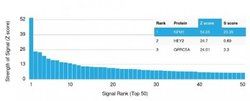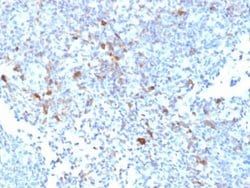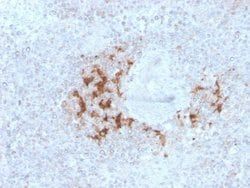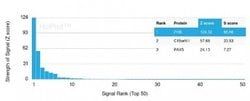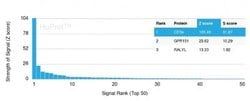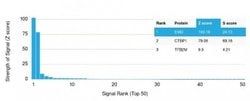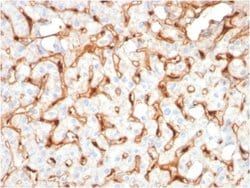Emerin, Mouse anti-Human, Clone: EMD/2167, Novus Biologicals™
Mouse Monoclonal Antibody
Manufacturer: Fischer Scientific
The price for this product is unavailable. Please request a quote
Antigen
Emerin
Concentration
0.2 mg/mL
Applications
Western Blot, Immunohistochemistry, Immunofluorescence, Immunohistochemistry (Paraffin), Peptide Array
Conjugate
Unconjugated
Host Species
Mouse
Target Species
Human
Gene Accession No.
P50402
Gene ID (Entrez)
2010
Immunogen
Recombinant human Emerin protein fragment (around aa 56-167) (exact sequence is proprietary)
Primary or Secondary
Primary
Content And Storage
Store at 4°C.
Clone
EMD/2167
Dilution
Western Blot 1-2 ug/ml, Immunohistochemistry 1-2 ug/ml, Immunocytochemistry/Immunofluorescence 1-3 ug/ml, Immunohistochemistry-Paraffin 1-2 ug/ml, Protein Array
Classification
Monoclonal
Form
Purified
Regulatory Status
RUO
Formulation
10 mM PBS with 0.05% BSA
Gene Alias
emerin, Emery-Dreifuss muscular dystrophy, LEM domain containing 5, STAEDMDLEMD5
Gene Symbols
EMD
Isotype
IgG1 κ
Purification Method
Protein A or G purified
Test Specificity
Emerin is a member of the nuclear lamina associated protein family. It is ubiquitously expressed and localized to the nuclear membrane in normal cells. Mutations of the gene that encodes emerin result in the X-linked recessive disease Emery-Dreifuss muscular dystrophy (EDMD), which is characterized by slowly progressing contractures, skeletal muscle wasting and cardiomyopathy. Reportedly, lack of Emerin expression is one cause of EDMD. Emerin is involved in the association of the nuclear membrane with the lamina, and is localized specifically to desmosomes and fasciae adherents in the heart. Identification of nuclear membrane irregularities with anti-emerin antibody has been reported useful in diagnosing papillary thyroid carcinoma.
Description
- Emerin Monoclonal specifically detects Emerin in Human samples
- It is validated for Western Blot, Immunohistochemistry, Immunocytochemistry/Immunofluorescence, Immunohistochemistry-Paraffin, Protein Array.
